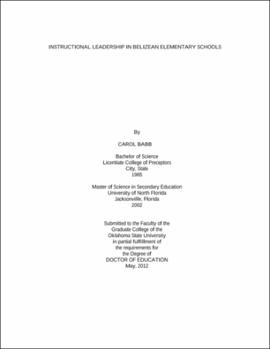| dc.contributor.advisor | Harris, Edward | |
| dc.contributor.author | Babb, Carol | |
| dc.date.accessioned | 2013-11-26T08:34:09Z | |
| dc.date.available | 2013-11-26T08:34:09Z | |
| dc.date.issued | 2012-05 | |
| dc.identifier.uri | https://hdl.handle.net/11244/7299 | |
| dc.description.abstract | Scope and Method of Study: | |
| dc.description.abstract | This study used a mixed methods design. The quantitative method used was a repeated measures design. The qualitative methods used were observations and participants reflections. The purpose of the study was to determine the impact of a training program for instructional leadership on the instructional leadership behaviors of Belizean primary school principals, specifically monitoring the curriculum and instruction, monitoring student progress, and supervision and support of teachers. | |
| dc.description.abstract | Findings and Conclusions: | |
| dc.description.abstract | The results of the study supported the null hypothesizes which stated that the training program would have no effect on principals' instructional leadership behavior as perceived by teachers. The results showed that there were no statistically significant difference in the pre- and posttest means. However, the results showed that in individual schools there were some differences. In school 17, the results showed that the training program had an effect on the principal's instructional behavior as perceived by the teachers, with posttest results exceeding pretest. | |
| dc.description.abstract | For School 18 there was statistical significance in the manner teachers perceived their principal after the training in the overall assessment and in each of the four subscales, but in this school, the pretest score was significantly higher than the posttest score, a negative result. For schools one and five the planning subscale showed that principals in these schools appeared to have improved in planning but not in other areas. All of the principals complained that time was a factor that kept them back from implementing the strategies and skills shared. | |
| dc.description.abstract | Recommendations: | |
| dc.description.abstract | For the instructional leadership model to work in Belize, principals would need intensive training and support, and concepts of time management and delegation would need to be included in the training. | |
| dc.description.abstract | All stakeholders in education would need to recognize that the role of the principal as an instructional leader is essential and every effort must be made to make sure that principals are able to spend more time in the classrooms and less time in the office. | |
| dc.description.abstract | There is the need to put an end to the one- shot training workshops and link the goals of the workshops to the goals and objectives of the MOE&Y. | |
| dc.format | application/pdf | |
| dc.language | en_US | |
| dc.rights | Copyright is held by the author who has granted the Oklahoma State University Library the non-exclusive right to share this material in its institutional repository. Contact Digital Library Services at lib-dls@okstate.edu or 405-744-9161 for the permission policy on the use, reproduction or distribution of this material. | |
| dc.title | Instructional leadership in Belizean elementary schools | |
| dc.contributor.committeeMember | Krumm, Bernita | |
| dc.contributor.committeeMember | Wanger, Stephen | |
| dc.contributor.committeeMember | Mwavita, Marumba | |
| osu.filename | Babb_okstate_0664D_11753.pdf | |
| osu.accesstype | Open Access | |
| dc.type.genre | Dissertation | |
| dc.type.material | Text | |
| dc.subject.keywords | elementary school principals | |
| dc.subject.keywords | instructional leadership | |
| dc.subject.keywords | studnet progress | |
| dc.subject.keywords | supervision | |
| dc.subject.keywords | teacher support | |
| thesis.degree.discipline | Higher Education | |
| thesis.degree.grantor | Oklahoma State University | |
